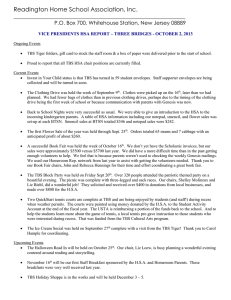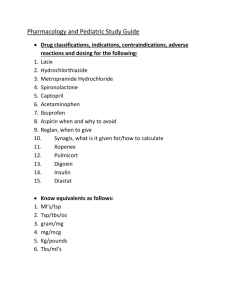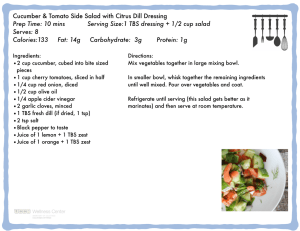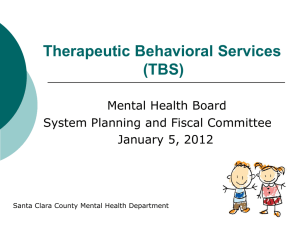Empowerment Resource #07 - Emily Q. v. Bontá
advertisement
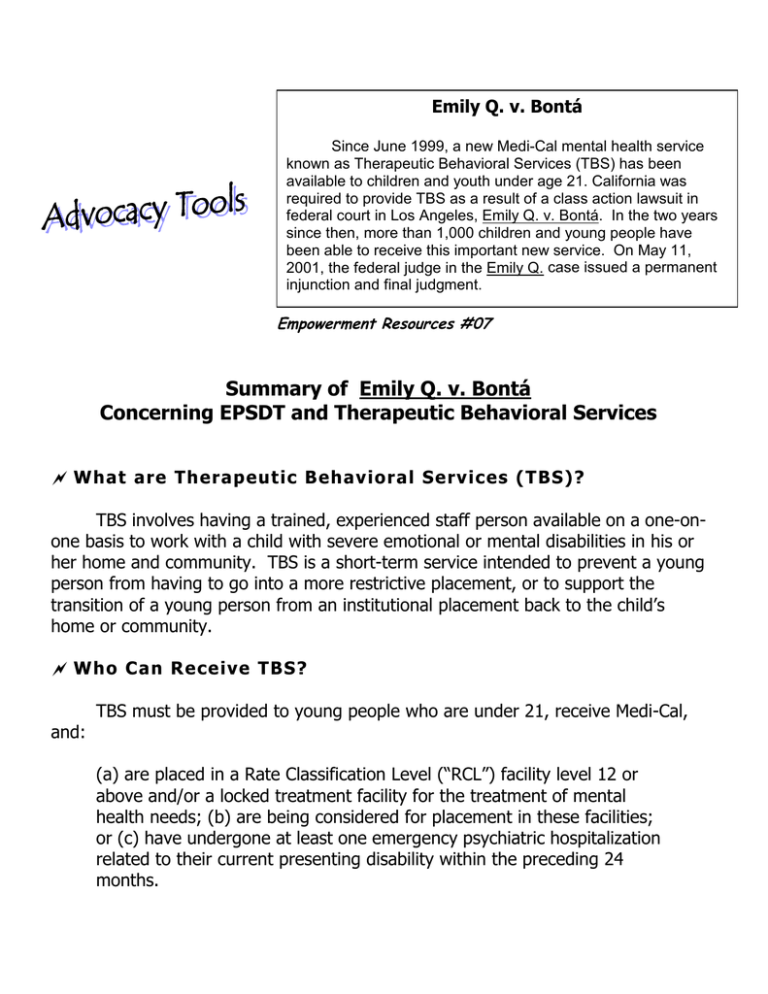
Emily Q. v. Bontá Since June 1999, a new Medi-Cal mental health service known as Therapeutic Behavioral Services (TBS) has been available to children and youth under age 21. California was required to provide TBS as a result of a class action lawsuit in federal court in Los Angeles, Emily Q. v. Bontá. In the two years since then, more than 1,000 children and young people have been able to receive this important new service. On May 11, 2001, the federal judge in the Emily Q. case issued a permanent injunction and final judgment. Empowerment Resources #07 Summary of Emily Q. v. Bontá Concerning EPSDT and Therapeutic Behavioral Services ~ What are Therapeutic Behavioral Services (TBS)? TBS involves having a trained, experienced staff person available on a one-onone basis to work with a child with severe emotional or mental disabilities in his or her home and community. TBS is a short-term service intended to prevent a young person from having to go into a more restrictive placement, or to support the transition of a young person from an institutional placement back to the child’s home or community. ~ Who Can Receive TBS? and: TBS must be provided to young people who are under 21, receive Medi-Cal, (a) are placed in a Rate Classification Level (“RCL”) facility level 12 or above and/or a locked treatment facility for the treatment of mental health needs; (b) are being considered for placement in these facilities; or (c) have undergone at least one emergency psychiatric hospitalization related to their current presenting disability within the preceding 24 months. In addition, the young person must be at risk of being placed in a higher level of residential care if they do not receive TBS or they must need TBS to transition to a less restrictive setting. ~ Who Provides TBS? In California, Medi-Cal mental health services are provided through a managed care system run by the county mental health department (known as a mental health plan or MHP). Each county MHP has its own plan for providing TBS and its own TBS providers. All TBS must be approved and authorized by the local MHP. In addition, the state Department of Mental Health (DMH) has issued detailed instructions about TBS and what the counties must do in providing it. These are available by calling the county MHP or from the DMH website: http://www.dmh.cahwnet.gov/Dmh_Docs/DMHLetters/99-03.pdf http://www.dmh.cahwnet.gov/Dmh_Docs/DMHLetters/99-04.pdf http://www.dmh.cahwnet.gov/Dmh_Docs/DMHNotices/99-09.pdf http://www.dmh.cahwnet.gov/Dmh_Docs/DMHNotices/00-03.pdf ~ New information and notices explaining the EPSDT mental health services for children and young people available through Medi-Cal. The final order from the Court includes new notice provisions to make sure that children and their families know about the mental health services available. Under the Medi-Cal Early and Periodic Screening, Diagnosis and Treatment (“EPSDT”) program, the Department of Health Services (DHS) and DMH developed a general informational notice describing the mental health services (including TBS) available from the county mental health departments. This notice was mailed to every Medi-Cal family in California in June 2001. DHS will modify its general brochure about the Medi-Cal program, the Child Health and Disability Prevention (“CHDP”) brochure, and the brochures prepared by each MHP to describe the available EPSDT mental health services and how to get them. DMH will issue a directive listing the mental health services which have been or may be covered as EPSDT supplemental mental health services and provide 2 information about how to obtain additional EPSDT mental health services which are not currently listed. DHS and DMH will also develop a special, more detailed notice about TBS. The DMH and the county MHPs within six months will begin sending both the general EPSDT notice and the TBS notice to children/young adults on Medi-Cal who are being considered for admission to Metropolitan State Hospital, Napa State Hospital, a psychiatric nursing home (known as an Institution for Mental Disease or “IMD”), RCL group home facilities of 13 and 14, and some RCL 12 facilities. Children who are currently in these facilities will also be given the new notices. These notices will be sent not just to the child, but also the child’s authorized representative (e.g., the parent, legal guardian, conservator, etc.). If a child has a court-appointed dependency attorney, he or she will also get these notices. The county MHP will arrange for the notices to be stapled into the dependency court file for new foster care cases. ~ New TBS Certification Procedures for Children Going into Residential Placement A new certification form must be completed to ensure that TBS is considered as an alternative before children and young people are placed in out-of-home residential placements. Within three months, county MHPs will adopt procedures for a qualified mental health practitioner to certify that TBS is not appropriate or available for class members before they are placed in Metropolitan State Hospital, Napa State Hospital, Institutions for Mental Disease, RCL group home facilities of 13 and 14, and some RCL 12 facilities. However, the failure to complete this certification form will not prevent an otherwise appropriate placement. ~ Assessments for 135 young people in Napa and Metropolitan State Hospital to determine if TBS will enable them to transition to a less restrictive setting. The Court ordered that each class member who has been placed in Metropolitan State Hospital or Napa State Hospital for three months or more is entitled to a special assessment to determine whether TBS would benefit the young person and would enable him or her to transition into the community. Within 30 days of entry of the Court Order, both sides in the lawsuit will agree on qualified mental health practitioner(s) to conduct the assessments. 3 ~ Compensatory TBS for Young People Over Age 21. The Court ordered that the state must provide compensatory TBS to all class members who are entitled to receive TBS but did not receive this mental health service between May 27, 1997, and the entry of the judgment in the case. These class members will be eligible to receive compensatory TBS beyond their 21st birthday. Young people over age 21 would start by documenting that they would have benefited from TBS earlier but that it was never available. Their TBS provider should submit this information to their county MHP and request an approval for compensatory TBS. ~ Ensuring Access to Qualified Providers The Court ordered that each county MHP ensure that it enrolls “a sufficient number of [TBS] providers to assess eligibility for TBS and/or to provide TBS to class members in its jurisdiction.” If the county fails to do so, DMH must ensure that the MHP adds providers and may also compile a list of outside TBS providers who can assist by providing services within the county. DMH must also adopt minimum qualifications for mental health providers to assess and/or provide TBS to class members. ~ What Advocates Can Do 1. Assist children/young adults and their families in understanding the notices they may receive about TBS or refer them to county staff who are knowledgeable about this service. 2. Check with the county Mental Health Plan to ensure that the MHP has procedures in place so that children/young adults and their families can access TBS. 3. Ensure that the MHP completes the certification forms before children are placed in out-of-home residential placements. 4. Advise hearing officers of the availability of TBS (and compensatory TBS) at certification and review hearings, Roger S., and other hearings where placement of children and young adults in locked facilities is being reviewed. 4

